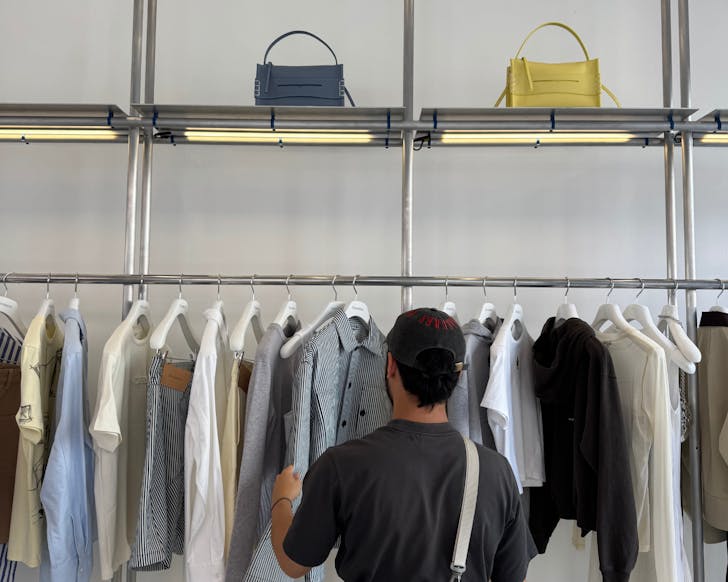Conscious Consumption: How To Shop Your Values, According To Our Team
Welcome to About Face, a feature series where, together with L'Oréal Groupe, we're shining a light on values-led shopping and consumption, with transparency, accountability and inclusion front of mind.
It’s one thing to want to shop your values (or talk about it)—it’s another to actually walk the walk. Then you throw greenwashing, vague mission statements and misleading labels into the mix, and supporting your favourite brands can feel more like solving a puzzle than treating yourself to something nice.
According to our recent About Face research report, we're witnessing the emergence of the trust gap—where consumers and shoppers are expecting better alignment between what they see and what's actually happening behind the scenes. If there's a disconnect? We're not buying into it.
So we teamed up with L'Oréal Groupe—where 100% of brands are committed to diversity, equity and inclusion—to ask our team of keen shoppers for their on-the-ground advice when it comes to conscious consumption. What values do they keep front of mind when making a purchase? And what steps are they taking before clicking through to checkout, or tapping their card?
Here's what they had to say.
Consistency Is Key
Design Lead Eric’s priority is shopping from businesses that don’t just talk the talk, but walk the walk.
“I like to give my business to places that highlight and platform the LGBTQIA+ community year-round, not just during Pride season,” he says.
“It’s reassuring if they truly live their values and aren't just after a quick buck—from the models they feature to the people they employ.”
Second-Hand Comes First
Head of Client Experience Sal is a savvy second-hand shopper. “I almost always ask myself first if I can get something second-hand,” she says.
“It’s generally the first filter I run through before making a purchase. If the answer’s no, then I’ll always try to look at the brand’s values and practices before purchase.”
For Sal, those values all come back to inclusivity.
“When I’m choosing where to spend my money, I look at whether a business is genuinely inclusive, not just in who’s leading it but in how they treat their people day to day,” she says.
“I’m drawn to women-led companies, and I pay attention to whether they’re backing older women in the workplace too, especially around things like menopause, which still gets overlooked. That’s how I try to make sure my purchases actually line up with my values.”

Transparency Is Telling
Commercial Content Editor Bridget is always on the lookout for brands that are honest about their practices.
“When I’m shopping or supporting brands, my number one priority is radical transparency,” she says.
“A real bugbear for me is brands that claim they’re designed in Australia, but then they manufacture overseas under poor working conditions or without environmental consideration. I’m always looking to shop for products or fashion that’s actually made in Australia, but if not, I’ll look into their supply chain transparency and worker conditions."
Shop Locally Made
When adding to her wardrobe, Junior Designer Stella is all about shopping local.
“I’m more inclined to shop with Australian brands, especially those that are handmade or designed and manufactured locally, and I’m willing to pay more for them compared to others,” she says.
“The main reasons are the quality, ethical production and the value I see in both the products and their stories.” She also loves the inclusivity of home-grown brands, adding that many cater to a more diverse size range.
Become A Repeat Customer
“Overconsumption is a major issue,” says Business Director Annie. She tries to keep this in mind, particularly when it comes to her wardrobe.
“I simply choose to buy less and ensure I love the piece of clothing and will enjoy it year after year.”
When she does make a purchase, she buys from brands she knows and loves. Even if it means opting for something a little spenny, she says she’ll fork out more to buy from a brand she trusts.
Every Step Counts
"I love supporting female-founded brands, but especially look to support businesses where you can see the impact across their supply chains," says our Client Service Director Flick.
“Whether that is sourcing from communities where it makes a difference, paying workers fairly, actively breaking the fast-fashion cycle, or using deadstock to give life to old products.”
Keen to shop more brands that align with your values? Read more on L'Oréal Groupe, where 16% of employees are over 50 years of age, and 53% of leading positions were held by women in 2023.
Editor’s note: This article is sponsored by L'Oréal Groupe and proudly endorsed by The Urban List. To find out more about who we work with and why read our editorial policy here.
